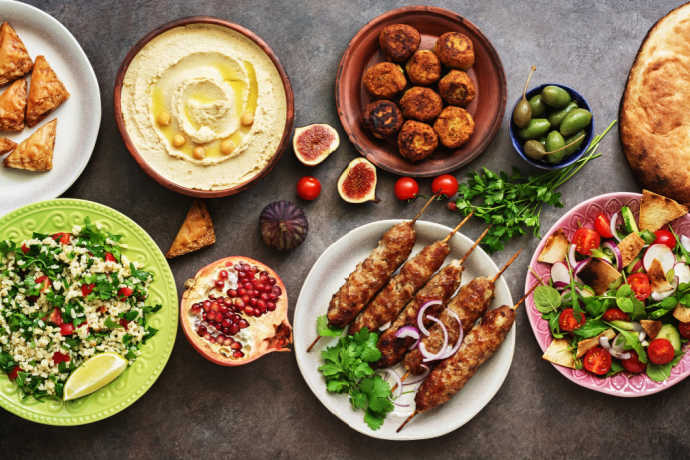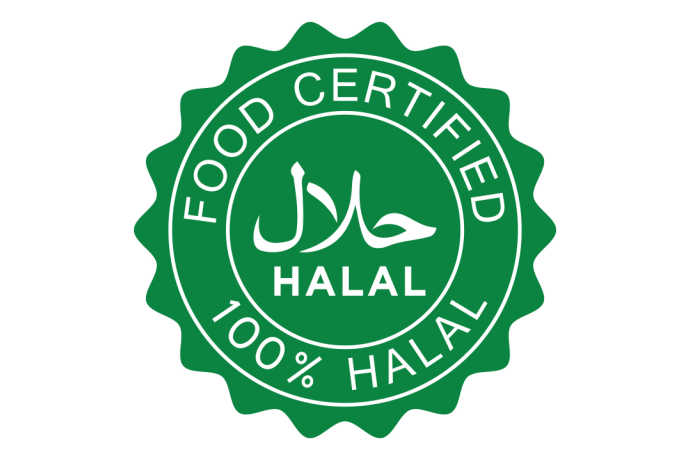All About Halal Cooking
Posted by Julie on Mar 8th 2023
We’ve devoted multiple blog posts to kosher cooking for Jewish holidays (like matzo ball soup, and desserts for Passover and Rosh Hashanah), along with vegetarian chili and burgers, and vegan basics like cheese, aquafaba, and cashew cream. Now we’ll turn to halal cooking. We’ll cover how foods are classified as halal or haram, and what this means for hosting guests who adhere to a halal diet.
What Is Halal?
Halal means “lawful” or “permitted” in Arabic. It refers primarily to food and drink. Whether a food or drink (or the ingredients used in preparing them) are halal is determined by the Quran. Haram means “unlawful” and refers to food and drink that is forbidden. The American Halal Foundation uses this helpful phrase to differentiate between halal and haram food and drink:
“Everything is halal, except ABCD IS haram.”
A refers to alcohol, B refers to blood, C refers to carnivorous animals (meat-eaters), D refers to dead meat (not slaughtered in compliance with Islamic practices), I refers to food immolated unto idols, and S refers to swine (pork and pork derivatives).

Another key distinction that determines whether a meal is halal or not involves the utensils, cookware, and dishware used for preparing and serving it. Similar to kosher cooking, halal cooking requires not only halal ingredients, but that nothing -- even the pots or pans, knives or forks -- has been contaminated by haram.
Between Halal and Haram
Some food and drink are not clearly halal or haram. Islamic law divided these into makrooh (meaning “detested” in Arabic) and mashbooh (meaning “suspected” in Arabic). Makrooh refers to food and drink that is not specifically forbidden, but which is harmful nonetheless. Mashbooh refers to food and drink that is potentially harmful, and therefore better avoided.
Who Follows a Halal Diet?
Muslims are not the only people who follow a halal diet. The American Halal Foundation notes there are over 2 billion halal consumers worldwide. Because halal cooking is known for being humane and health-conscious, many non-Muslim people choose to eat and drink in accordance with Islamic law for these reasons.
The Details of Halal Cooking
Now that we’ve shared some background information behind halal cooking, let’s dive into the practicalities. We know you probably don’t have separate sets of dishes, but there are other, far simpler steps you can take to prepare halal meals.
First, avoid serving alcohol -- not just to your guests who follow a halal diet, but in general. It will make for a more comfortable environment for them. Similarly, omit any pork or pork products, including bacon.

If you do choose to serve meat, purchase it from a halal butcher to ensure it has been slaughtered in compliance with Islamic practices. Otherwise, a vegetarian meal will do nicely. Of course, be sure that your meal truly is vegetarian -- no chicken broth or sauces that may contain meat products or alcohol. Check the labels of your ingredients, especially any processed foods, to see if they are halal-certified.
Tricky Ingredients
Unfortunately, not all ingredients are easily identifiable as halal or haram. (Or even as makrooh or mashbooh.) For example, cheese may be made with pork or beef enzymes, which can mean it is haram. Best to seek out cheese that is certified halal. Look for labels on processed seafood, bottled sauces and dressings, and packaged desserts too.

Even baking can be challenging, as white sugar can be processed with haram ingredients. Try sugar substitutes that are certified halal. Vanilla extract is another ingredient that is open to interpretation, as it does contain alcohol. Check with your guests, or use alcohol-free vanilla extract or a vanilla bean instead.
We found a long list of ingredients that you may see in ingredient lists on packaged and processed foods, with the halal or haram status of each. Many ingredients are classified as doubtful, meaning they may be considered mashbooh. Err on the side of caution, and leave products containing these ingredients off your menu.
Traditional Halal Foods
While halal isn’t technically a term for a particular variety of ethnic food, it has come to be used in that way. People will often refer to such dishes as falafel or shawarma as “halal”, without regard for their ingredients or how they are prepared. We’d love to share two delicious-sounding recipes we found, but you’ll have to be sure the ingredients you use are certified halal.

Try this Halal Cart-Style Chicken and Rice from Serious Eats. It only takes an hour to marinate the chicken thighs, which aren’t as apt to dry out as chicken breast. Buy them from a halal butcher if you are serving guests who adhere to a halal diet. Be sure to use Basmati rice for the authentic taste and texture, toast the strips of pita bread, and don’t forget the white sauce.
Another recipe to consider is this one for Falafel from Boxed Halal. It’s vegetarian, so no need to worry about whether the meat is halal. Instead, this recipe calls for chickpeas. You’ll need a food processor to puree the chickpeas and cashews. Pan fry each croquette in hot oil, and serve them with yogurt sauce.

